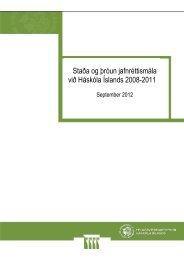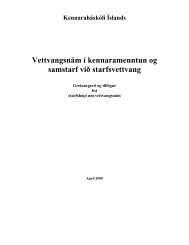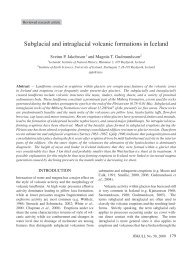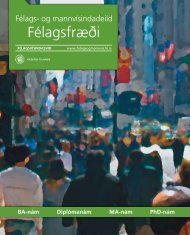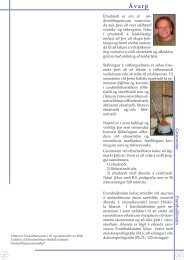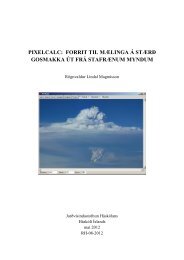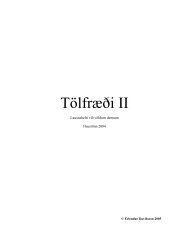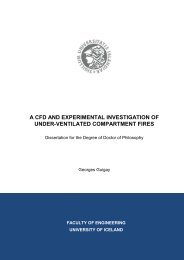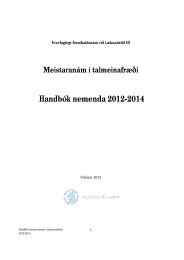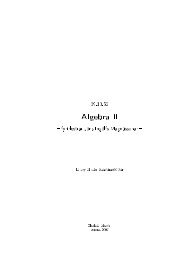Journal of Germanic Linguistics Late Placement of the Finite Verb in ...
Journal of Germanic Linguistics Late Placement of the Finite Verb in ...
Journal of Germanic Linguistics Late Placement of the Finite Verb in ...
You also want an ePaper? Increase the reach of your titles
YUMPU automatically turns print PDFs into web optimized ePapers that Google loves.
262 Haukur orgeirsson<br />
The example <strong>in</strong> 31 conta<strong>in</strong>s an unbound clause, and its f<strong>in</strong>ite verb tawido<br />
‘made’ is clearly <strong>in</strong> a late position (see órhallur Eyórsson 2001:22–23<br />
for a more detailed analysis). Some <strong>of</strong> <strong>the</strong> Eddic <strong>in</strong>stances above have a<br />
similar structure. Here is one example:<br />
(32) Oddrúnargrátr<br />
17.1–2 Brynhildr í búri /bora raci.<br />
Brynhildr <strong>in</strong> bower.DAT /border.ACC embroidered<br />
‘Brynhildr embroidered a border <strong>in</strong> <strong>the</strong> bower.’<br />
The fornyrislag meter is <strong>the</strong> most direct descendant <strong>of</strong> <strong>the</strong> common<br />
<strong>Germanic</strong> meter. It seems plausible that it would preserve some archaic<br />
l<strong>in</strong>guistic features not found <strong>in</strong> more recently developed meters, such as<br />
dróttkvætt.<br />
Given this, I propose that late placement <strong>of</strong> <strong>the</strong> verb is an archaic<br />
remnant <strong>of</strong> <strong>the</strong> freedom <strong>in</strong> word order present <strong>in</strong> <strong>the</strong> language at an earlier<br />
stage. If this were true, it would be reasonable to expect late<br />
placement to occur most prom<strong>in</strong>ently <strong>in</strong> <strong>the</strong> oldest poems and ever less <strong>in</strong><br />
<strong>the</strong> newer ones. It has already been mentioned that Kuhn did not detect a<br />
significant difference between older and newer poems <strong>in</strong> this respect;<br />
however, s<strong>in</strong>ce I do not believe Heusler’s chronology <strong>of</strong> <strong>the</strong> Eddic poems<br />
to be accurate, this is not necessarily a problem.<br />
However, if <strong>the</strong> Eddic chronology <strong>of</strong> Heusler and his followers is not<br />
to be trusted, <strong>the</strong>n what criterion can be used to evaluate <strong>the</strong> idea that late<br />
placement <strong>of</strong> <strong>the</strong> verb is an archaic feature? I propose to compare this<br />
putative archaic feature with ano<strong>the</strong>r feature known to be archaic. The<br />
most suitable l<strong>in</strong>guistic feature <strong>of</strong> this sort is <strong>the</strong> expletive particle um/<strong>of</strong>.<br />
A conspicuous feature <strong>of</strong> Gothic and <strong>the</strong> West <strong>Germanic</strong> languages<br />
is <strong>the</strong> presence <strong>of</strong> unstressed prefixes, such as ga-/ge-. In Old Norse, <strong>the</strong><br />
correspond<strong>in</strong>g prefixes were almost completely lost, and very few traces<br />
<strong>of</strong> <strong>the</strong>m rema<strong>in</strong> <strong>in</strong> <strong>the</strong> oldest prose texts. In old poetry, however, <strong>the</strong><br />
expletive particle variously written as <strong>of</strong> or um represents <strong>the</strong> remnants <strong>of</strong><br />
<strong>the</strong> old prefixes. Thus, Old Norse rúni ‘friend, confidant’ corresponds to<br />
Old English gerúna ‘counselor, confidant’. In Haustlng, <strong>the</strong> oldest<br />
poem to preserve this word, it appears as <strong>of</strong> rúni.<br />
In his detailed study <strong>of</strong> <strong>the</strong> expletive particle, Kuhn (1929) po<strong>in</strong>ted<br />
out that it was most amply present <strong>in</strong> <strong>the</strong> oldest poetry and decl<strong>in</strong>ed <strong>in</strong>



